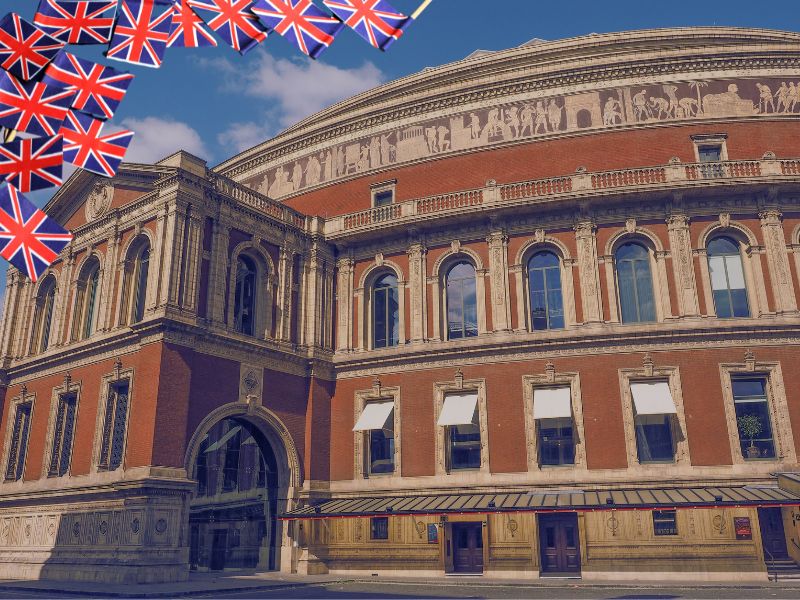In the heart of London’s cultural landscape stands an architectural masterpiece that has resonated with the world for over a century—the Royal Albert Hall. This iconic venue, with its distinctive circular design and awe-inspiring dome, is not merely a concert hall; it is a living testament to the power of music and a symbol of grandeur.
A Monument to Prince Albert
The Visionary
The Royal Albert Hall was conceived as a tribute to Prince Albert, the beloved consort of Queen Victoria, who passed away in 1861. Prince Albert was a visionary who ardently supported the arts and sciences. His passion for culture and learning was instrumental in shaping the institution that bears his name.
A Grand Design
Opened in 1871, the Royal Albert Hall was designed by Captain Francis Fowke and Major-General Henry Y.D. Scott. Its distinct architectural style, combining Italianate, Byzantine, and Gothic elements, sets it apart from any other venue in the world. The Great Organ, with its majestic pipes, adds to the hall’s splendor.
A World Stage
A Variety of Performances
Over the decades, the Royal Albert Hall has hosted an astonishing array of performances, ranging from classical concerts to rock gigs and everything in between. World-class orchestras, legendary rock bands, and renowned solo artists have all graced its stage. It is a place where musical genres converge.
Proms: A Summer Tradition
The Proms, short for the Promenade Concerts, are a quintessential British tradition held annually at the Royal Albert Hall. These summer concerts feature a diverse repertoire and offer a unique experience where the audience can stand in the central arena, creating an atmosphere of shared excitement.
Architectural Marvel
The Acoustic Wonder
One of the most remarkable features of the Royal Albert Hall is its acoustic excellence. The distinctive shape of the auditorium and the strategically placed “mushrooms” on the ceiling contribute to the hall’s superb sound quality. It is said that a pin dropped on the stage can be heard in every corner of the hall.
Behind the Scenes
For those curious about what goes on behind the scenes, guided tours of the Royal Albert Hall provide insights into its rich history, from its royal opening to the present day. Visitors can explore the corridors that have echoed with the footsteps of musical legends.
The Royal Legacy
A Royal Patronage
The Royal Family has had a long association with the Royal Albert Hall. Queen Victoria herself attended the hall’s opening ceremony, marking the beginning of a royal tradition. Today, it continues to receive royal patronage, with members of the Royal Family attending and participating in events.
Preservation and Modernization
Preserving History
Preserving the Royal Albert Hall’s historical integrity while modernizing its facilities has been a delicate balancing act. Renovations over the years have sought to enhance the visitor experience while safeguarding the hall’s original charm.
Cultural Icon
Global Influence
The Royal Albert Hall’s impact extends far beyond the borders of the United Kingdom. Its reputation as a world-class venue has made it a magnet for international artists, ensuring its place on the global stage.
A Symbol of London
The Royal Albert Hall has become an enduring symbol of London’s cultural identity. Its silhouette against the city’s skyline is instantly recognizable, and its concerts are attended by people from all corners of the globe.
The Enduring Legacy
A Century and Beyond
As it enters its third century of existence, the Royal Albert Hall remains an enduring testament to the power of music to inspire, unite, and uplift. It stands as a living monument to Prince Albert’s vision and a symbol of London’s cultural grandeur.
In the hallowed halls of the Royal Albert Hall, where music transcends time and genre, the legacy of a prince’s vision lives on. It is a place where the grandeur of architecture meets the magic of music, creating an experience that continues to captivate and inspire audiences from around the world.
Visiting the Royal Albert Hall is not merely attending a performance; it is embarking on a journey through history, culture, and the eternal power of music.
